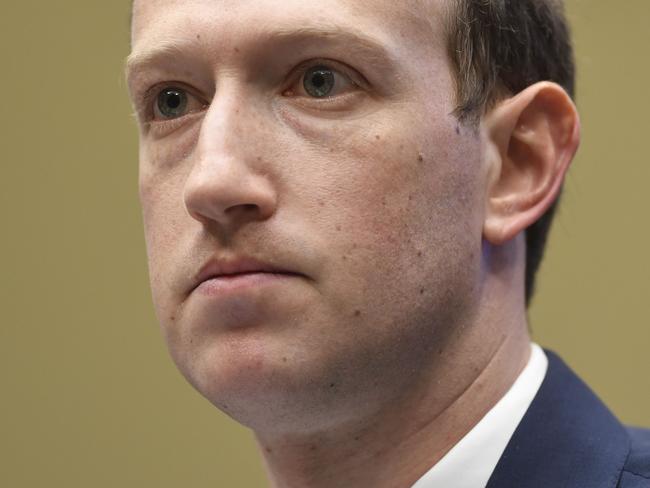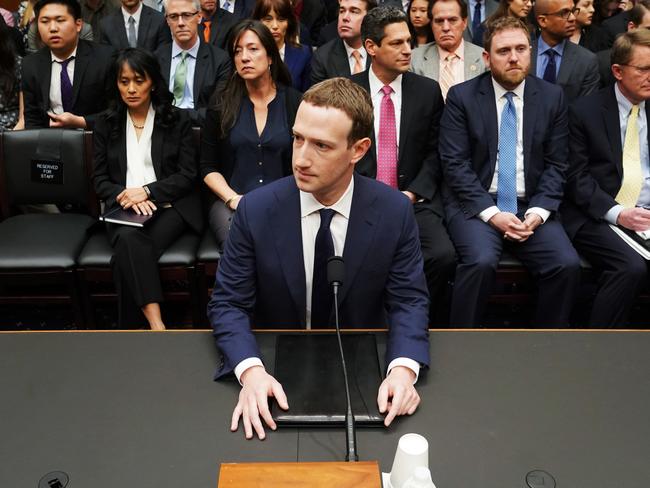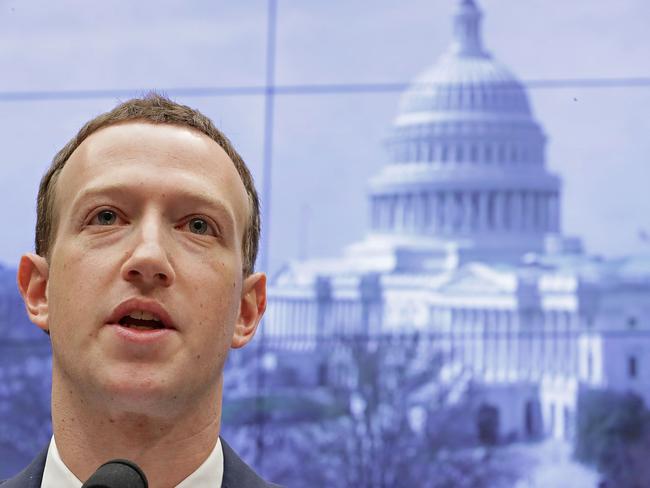‘Disappointing’: Zuckerberg clashes with Congress as he refuses to promise Facebook will limit data collection
MARK Zuckerberg got testy during another tense grilling by American leaders as he refused to make a key commitment to Facebook’s users.
MARK Zuckerberg clashed with his questioners in Congress during a fiery session today after he was asked to promise Facebook would limit user data collection.
The Facebook CEO refused to give a yes or no answer, prompting New Jersey Congressman Frank Pallone to say he was “disappointed”.
Mr Pallone asked Mr Zuckerberg: “Will you commit to changing all default settings to minimise to the greatest extent possible the collection and use of users’ data?”
The social media executive began to answer, “We try to collect ...” but Mr Pallone interrupted to ask for a yes or no answer, adding, “it can’t be that hard to say yes.”
But Mr Zuckerberg still refused to make the commitment, saying, “This is a complex issue that deserves more than a one-word answer.”
Mr Pallone replied: “That’s disappointing to me.”

It wasn’t the only time the social network boss butted heads with questioners from the Energy and Commerce Committee in the House of Representatives on his second day of questioning in Washington following the Cambridge Analytica scandal.
Mr Pallone seemed to echo the view of many in the lower chamber when he said: “For all the good it brings, Facebook can be a weapon ... Facebook is the latest in string of companies that hoover up our data without keeping it safe.”
While Tuesday’s five-hour Senate hearing was relatively tame, politicians in the House were far more aggressive during their equally long session, with each allowed four minutes to grill the Facebook chief.
Committee chair Greg Walden opened the discussion by saying: “While Facebook has certainly grown, I worry it has not matured. I think it is time to ask whether Facebook may have moved too fast and broken too many things.
“There are critical, unanswered questions surrounding Facebook’s business model and the entire digital ecosystem regarding online privacy and consumer protection.”
After Mr Zuckerberg stayed calm during a gruelling hearing yesterday, he was again forced to confront issues of how users’ privacy had been breached by CA, extremism had spread on his platform and election meddling had taken place.
The Facebook chief said the company had begun the process of contacting the 87 million people whose data was secretly collected by the political orgnaisation — and that his own personal data had also been mined.

Illinois Congressman Bobby Rush was one of many to ask why Facebook’s default privacy settings weren’t stronger. “Why is the onus on user to opt in?” he asked.
Mr Zuckerberg answered: “Every time a person chooses to share something, they’re proactively going to the service. There’s a control right there when they’re posting about who they want to share it with.”
Congresswoman Anna Eshoo said she thought the privacy settings were a “minefield”, adding: “I think this has been blurred.”
She asked: “Are you willing to change your business model to protect users’ privacy?”
But Mr Zuckerberg said he wasn’t sure what that meant. He several times stated that he didn’t understand a question or would have to have his team look into the answer.
When the Facebook exec told her the company was “going to look into every app that had access” to users’ data, Californian Ms Eshoo snapped back: “So you’re not aware.”
Marsha Blackburn said she thought his “cosy community was starting to look like the Truman Show”, with everyone’s personal data available online. “Who owns the virtual you?” the Tennessee Congresswoman asked.
“I can’t let you filibuster right now,” she added, as Mr Zuckerberg started to answer.
Texas Democrat Gene Green and Illinois Democrat Jan Schakowsky also pushed him on whether Facebook planned to give users worldwide the same privacy controls required by a tough new European Union data protection law. Experts say a number of Facebook’s current practices seem to violate the law.
Mr Zuckerberg said the company plans to put a tool “at the top of everyone’s app” where users will be able to make privacy and sharing choices. But it may not explicitly ask users to opt-in in every country, depending on legal issues.
To comply with the law, it would need to provide any data Facebook collected about users from other websites, any data acquired from third parties and any categorisations Facebook created for users.
Texas Republican Joe Barton and others followed up on yesterday’s questioning by Senator Ted Cruz over whether Facebook is censoring right-wing content from groups, including pro-Trump vloggers Diamond and Silk.
Mr Zuckerberg denied there was any censorship, adding, “there is absolutely no directive” to have “any kind of bias in anything we do.”
Mr Barton asked if he would agree that Facebook would work to ensure it is “a neutral public platform.”
“I do agree that we should give people a voice,” Mr Zuckerberg replied.
Questioned on whether Facebook was a financial institution, technology company or media company, the Facebook boss said it was a tech company first and foremost.
The 33-year-old said he supported regulation, but only as long as it didn’t cause problems for start-ups.
After yesterday’s hearing, Republican Senator Lindsey Graham said in a statement: “Most Americans have no idea what they are signing up for because Facebook’s terms of service are beyond comprehension.”
He called Facebook a “virtual monopoly” and said “continued self-regulation is not the right answer when it comes to dealing with the abuses we have seen on Facebook.”
Despite the attacks however, Wall Street gave his performance the seal of approval. On Tuesday, Facebook stock ended its best day in two years, jumping 4.5 per cent to $212.75, and on Wednesday, it added another $3.8.
The social network founder yesterday apologised profusely for not protecting users. “I think we need to step up more,” he said, revealing that “tens of thousands” of apps are being audited by the platform in case they committed breaches similar to that which saw CA sell off users’ information.
“It’s clear now that we didn’t do enough to prevent these tools from being used for harm,” he said. “It was my mistake and I’m sorry. I started Facebook, I run it, and I’m responsible for what happens here.”
Democrat Senator Richard Durbin asked if Mr Zuckerberg was willing to reveal which hotel he was staying in or who he had been messaging in the past week.
“No. I would probably not choose to do that publicly here,” Mr Zuckerberg said.

Mr Dubin replied: “I think that may be what this is all about; your right to privacy. The limits of your right to privacy. And how much you give away in modern America in the name of, quote, connecting people around the world.”
The Facebook boss said he understood if the victims of the data breach — including more than 300,000 Australians — were angry.
“They did not want their information to be sold to Cambridge Analytica by a developer and that happened and it happened on our watch,” he said.
“I think we have a responsibility to protect everyone in our community from anyone in our ecosystem who is going to potentially harm them and I think we haven’t done enough historically.”
Mr Zuckerberg confirmed that the world’s most popular social media platform was considering implementing a paid platform that would protect user data from targeted advertising. The ad-free, or pay for your privacy option, was hinted at by Chief Operating Officer Sheryl Sandberg last week.
Facebook’s advertising revenue, driven largely by targeting ads on the back of what its two billion users tell their friends they like, was more than $51 billion last year.
Senator Bill Nelson asked how Facebook would protect users who did not wish to see product placements from flooding their feed. “Are you actually considering having Facebook users pay for you not to use that information?” Senator Nelson asked.
“In order to not run ads at all we would need some sort of business model,” Mr Zuckerberg explained.
But he said “there will always be a version of Facebook that is free”.
Mr Zuckerberg revealed the company is co-operating with Special Counsel Robert Mueller’s investigation into Russian influence on the 2016 US election, but would not elaborate further.
He insisted Facebook, which he repeatedly said he had created with a friend in his Harvard dorm room, was not too big to control.
Despite the controversy and the #deletefacebook movement, Mr Zuckerberg said there had not been a noticeable number of users moving away from the platform.



